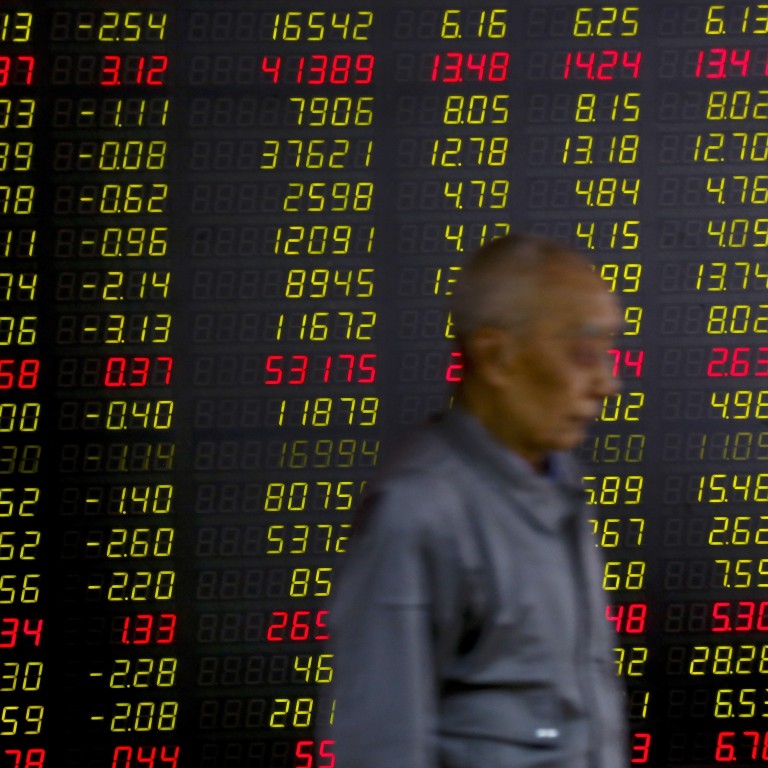
US-China tech battle hammers stocks from Shanghai to Hong Kong
- Surveillance companies reported to be under US blacklist consideration lead the declines
- Telecom stocks related to 5G also suffer sell-off after Huawei receives another blow from carriers, chip designer
China and Hong Kong stocks suffered steep losses on Thursday, weighed down by technology shares, as investors feared a new US-China tech war on media reports that Washington was considering blacklisting more Chinese tech firms.
The Shanghai Composite Index declined 1.4 per cent to 2,852.52, barely holding up at the 2,850-point level that some say is a critical level for bulls to defend. The Shenzhen Component Index plunged by 2.6 per cent, and the ChiNext Index was down 2.5 per cent.
In Hong Kong, the Hang Seng Index lost 1.6 per cent to 27,267.13, the lowest level in four months.
The decline came after Bloomberg reported that the US was considering blacklisting four other surveillance technology firms in addition to Hikvision Digital, one of the world’s largest surveillance camera makers.
Previously, Chinese telecommunication equipment giant Huawei Technology was placed by the Trump administration on an “Entity List”, which would prevent US companies from doing business with it when it comes into effect in three months.
“Escalation of the [Huawei] dispute could damage tech companies not only in China but globally, including in the US,” analysts Greg Kuhnert and Anton du Plooy at Investec Asset Management wrote in a note published on Thursday.
If the hostility between the US and China on technology intensifies, the ability of US tech firms such as Apple to sell to China may be restricted, and Chinese authorities are likely to retaliate, according to the note.
In a move to relieve some of the US pressures, the Chinese government said it would give its home-grown chip designers and software makers a five-year tax holiday. Semiconductors have been into the spotlight since the Huawei ban, as one of the most critical components it sources from US companies is chips.
Surveillance companies reported to be under US blacklist consideration led the declines. Hangzhou Hikvision Digital Technology dropped 5.8 per cent, and Meiya Pico was down 9.6 per cent. Iflytek lost 7 per cent and Zhejiang Dahua Technology shed 4.6 per cent.
Telecom stocks also declined broadly, after carriers in Taiwan, Japan and the UK decided to either drop Huawei phones for 5G customers or reconsider the sales. Furthermore, UK-based chip designer Arm Holdings was reported by the BBC to be suspending business with Huawei because some of its technology is from the US.
A gauge of 128 Chinese telecom stocks related to 5G declined 4.7 per cent in early trading, and an index of 139 Huawei-related stocks fell 3.7 per cent. DongHua Testing Technology, which supplies mechanics performance test systems to Huawei, plunged by the maximum 10 per cent. Wutong Holding Group, which sells radio frequency connection systems to Huawei, was also down 10 per cent.
In Hong Kong, smartphone component makers tumbled, as their top clients Huawei and Apple are facing different troubles amid intensifying hostility between the US and China on technology.
While overseas carriers weigh whether to stop selling Huawei phones to 5G customers, Apple is facing a backlash in China amid rising nationalistic sentiment.
Sunny Optical Technology declined 7.7 per cent. AAC Technologies fell 6.4 per cent, and Q Technology tumbled 8.5 per cent.
Other technology and internet stocks suffered too. Tencent Holdings, China’s gaming and social network giant, declined for a sixth straight session after it reported first-quarter earnings. The shares fell 3.8 per cent to a four-month low. Smartphone and home appliance maker Xiaomi Corp shed 3 per cent.

